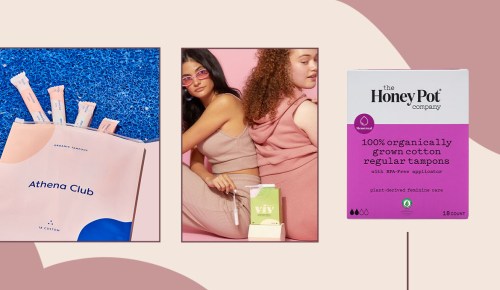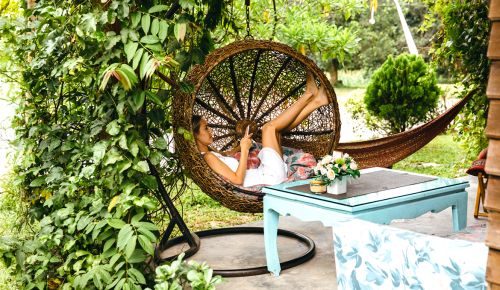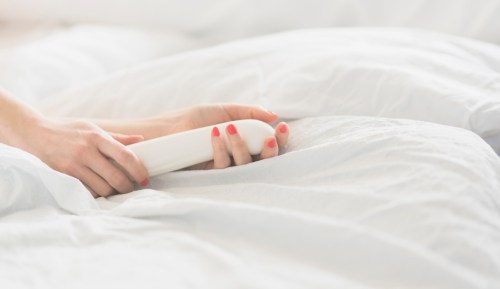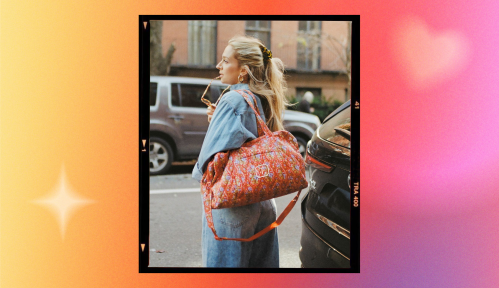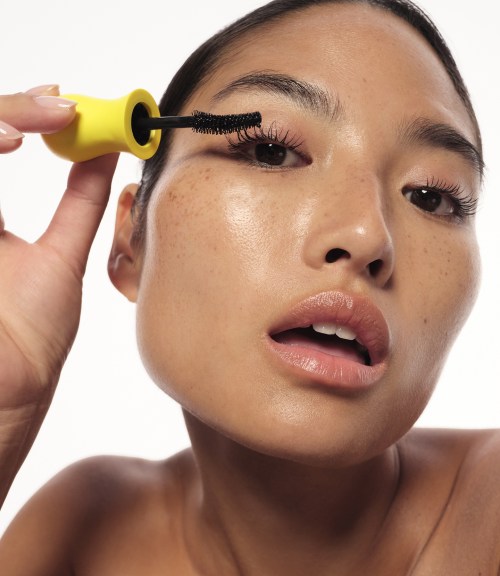Our editors independently select these products. Making a purchase through our links may earn Well+Good a commission
The supply-chain issues of 2022 led to a tampon shortage that left few uterus-having people (whether pregnant, parenting, or menstruating) unaffected. Thankfully, the rise in direct-to-consumer tampon companies helped ensure the period-care staple remained available, despite logistical obstacles. And, not only are these D2C brands committed to keeping tampons accessible, they’re also working to make them better, both for your health and the environment. If you’re ready to make the switch from drugstore period products, we have a handful of newly-available tampon brands for you to explore.
The best D2C tampon brands, at a glance
In many cases, the specific tampon brands that have available stock are able to get around a number of supply-chain issues because they utilize different materials than the drugstore brands—and typically, more sustainable materials at that (win, win). For example, period-care companies like Viv, Flo, and August use materials like organic cotton and bamboo, corn fiber, and sugarcane-derived applicators in their pads and tampons (as opposed to plastic), which has insulated their production processes from many plastic-centric supply-chain issues.
“Inflation on many of the plastic composite parts in pads, for example, is as much as 20 percent,” says Nick Jain, co-founder and COO at August. “As a commodity at such a low price point, a 20 percent increase in raw-material cost either forces a company to increase prices or take a hit on product margins, which limits their cash flow.” In that scenario, it also becomes tougher for a company to hold a bunch of inventory in stock (already an expensive thing to do), adds Jain. And now, the companies that chose not to hold that inventory are facing significant shortages, as plastic becomes more challenging to procure.
“In a time where things feel especially fragile, it’s more important than ever to have our basic biological needs covered.” —Tara Chandra, co-founder of period-care company Flo
But while these differences in raw materials have certainly made it easier from the outset for some eco tampon brands to keep their product available, it’s not to say they’ve all been immune to other supply-chain issues in the past, like staffing shortages and congested ports. And these logistical holdups might’ve very well still affected their ability to keep product well-stocked, had it not been for their deep-rooted values to protect menstruators at every turn. “We’ve been acutely dialed in to building our supply over time, and our operations team has made it a top priority from the beginning of this year to secure weeks of supply for our menstrual-care products,” says Beatrice Dixon, CEO of intimate-care brand The Honey Pot Co.
Simply acknowledging that these products are essential has also led many smaller tampon companies to structure their supply chains around ensuring availability, often by placing large orders in advance (at whatever cost necessary)—and particularly right now, given the bleak reproductive-health landscape in America. “In a time where things feel especially fragile, where we’re struggling to get our hands on formula and our reproductive rights are at risk, it’s more important than ever to have our basic biological needs covered,” says Tara Chandra, co-founder of Flo.
It’s worth pointing out that because a number of the materials used in the available tampons are more premium than those in their drugstore counterparts, they may come in at a higher price point per box. But, for folks who have a flexible spending account (FSA) or health savings account (HSA), most are eligible to expense, thanks to the CARES Act. Below, find the tampon brands taking special care to support menstruators with readily available products for this basic, biological function.
9 period product brands you should know

August, Tampons (Price Varies)
Founded as a gender-inclusive, eco-friendly, and financially accessible alternative to traditional period-care brands, August launched amid the pandemic. Because of that timing, founders Nadya Okamoto and Nick Jain were ready to incorporate resiliency into their supply chain from the start. “We made the decision to keep four to six months of inventory on hand at any given time, so that when the production cycles slow down [as they are now], we have reserve stock that we can sell through,” says Jain.
With August, you can combine their various period products (pads, liners, and tampons) to build a custom box for a subscription or a one-time purchase. Your purchase does require a 20 unit minimum, though, so that’s something to keep in mind.
Materials: 100 percent organic cotton (including the string), BPA-free plastic applicator (that’s recyclable when washed off)
Tampon sizes: Light, Regular, Super
Pros:
- Easily customizable subscription
- Good variety of sizes and
Cons:
- Requires 20 items per box to ship
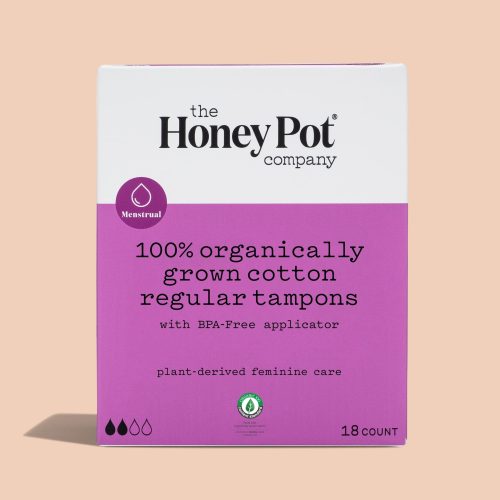
The Honey Pot Company, Organic Tampons — $13.00
Part of why you can always count on The Honey Pot Co. to have tampons in stock is because of the many different varieties they offer “for differing needs and humans,” says Dixon, ranging from regular to super absorbency to compact and even compact super-plus. They’re all made with organic cotton and a BPA-free, plant-based applicator.
Though the brand also sells a variety of other menstrual-care products, including a menstrual cup, Dixon is committed to always keeping tampons, at $13 for a box of 18, in stock. “Much like pads, tampons have been at the core of menstrual products for much of the last century, so while providing new options is great, you cannot ignore the cultural implications of such a key product as a tampon,” she says.
Materials: Cotton, sugarcane-derived applicator
Tampon sizes: Regular, Super, Super Plus
Pros:
- Widely available at big box stores
- Variety of period products to choose from
Cons:
- No light size tampons
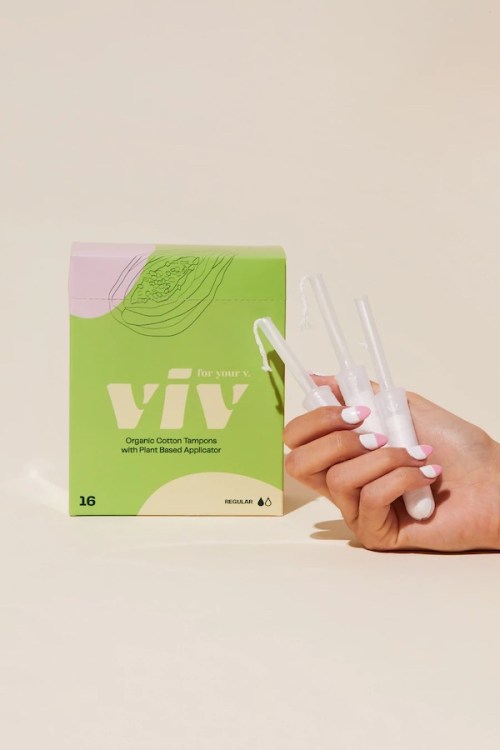
Viv, Tampons — $9.00
Viv tampons, which come as a box of 18 tampons for $9, have the distinction of being fully plant-based, thanks not only to the organic-cotton core, but also, a sugarcane-derived (rather than plastic) applicator. (Notably, the company’s pads and liners are made with bamboo and corn fiber.) “Because our material-sourcing and manufacturing processes look very different from those of traditional big-box brands, we’ve been able to stay secure in our supply chain,” says Katie Diasti, founder and CEO.
Given that Diasti’s goal is equally centered on reducing period stigma as it is on minimizing the environmental impact of periods, she’s also working to build a community around uplifting menstruators of all kinds—especially in the current climate. “The tampon shortage is not just a headline or trend; it will directly impact the most marginalized menstruators and is a reflection of the ways in which menstrual health has been neglected and hush-hush for far too long,” she says. And, to expand their reach, you can now also find Viv’s tampons on Amazon.
Materials: Cotton, sugarcane-derived applicator, bamboo and corn fiber (for pads and liners)
Tampon sizes: Regular, Super
Pros:
- Relatively inexpensive
- Non-toxic, sustainable materials
Cons:
- Less size options than some other brands
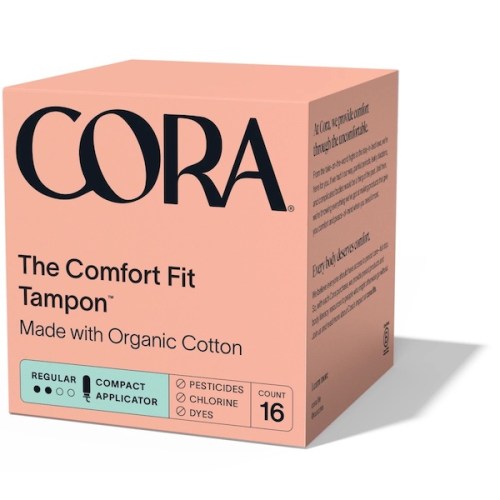
Cora, Comfort Fit Tampon — $10.00
Making safe period-care products available to all and busting period poverty has been at the heart of Cora’s purpose since the company was founded in 2014. And according to chief marketing officer Dana Cohen, that won’t be changing anytime soon: “As a female-owned brand, we believe that no matter what, menstruators need access to period-care products.”
At the moment, Cora, which sells boxes of 16 tampons for $10, has plenty of available stock (both through the Cora website and across retailers like Amazon). Cohen says Cora has also seen increased interest in the brand’s reusable period products—particularly the period disc, which launched last year and which she suspects may help offset some of the demand for the brand’s tampons.
Materials: Organic cotton, sugarcane-derived applicator
Tampon sizes: Light, Regular, Super, Super Plus
Pros:
- Inclusive tampon size range
- With every purchase Cora donates period products to those in need
Cons:
- Some customers say the flat-expansion design allows for leaks
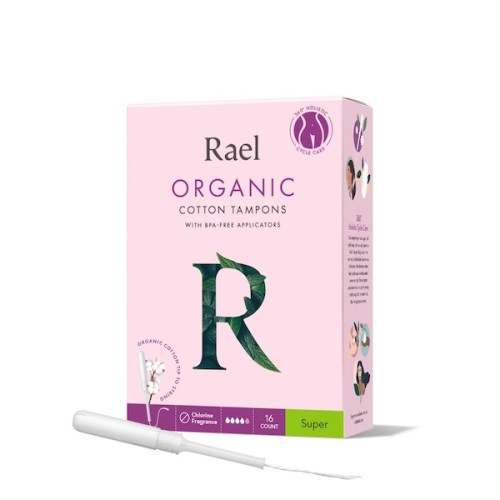
Rael, Organic Cotton Tampons (16-Count) — $9.00
“When the supply-chain problem started happening [over the past couple years], we foresaw the issues that many brands are facing now and made sure to ramp up the number of products we typically order for production,” says Yanghee Paik, CEO and co-founder.
Made with tip-to-string organic cotton, Rael’s tampons, $9 for 16, also have an organic-cotton protective “veil” to prevent fabric from shedding within the vagina and minimize leaks. And, while this brand doesn’t use sugarcane-derived applicators (like most of the others on our list), they do use BPA-free plastic.
Materials: Organic cotton, BPA-free plastic
Tampon sizes: Regular, Super
Pros:
- Organic cotton veil to prevent shedding
- Lower-priced option
Cons:
- Limited size options
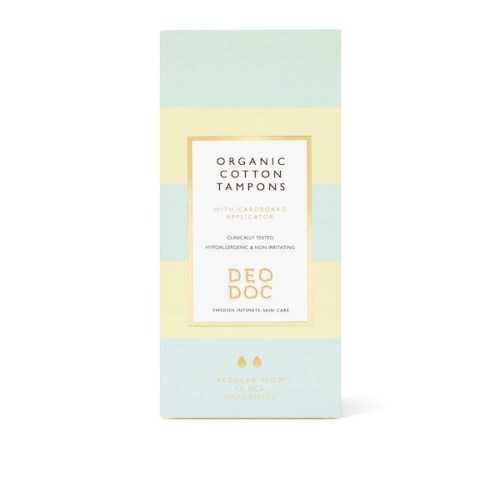
DeoDoc, Cotton Tampons — $9.00
A biodegradable cardboard applicator (and biodegradable packaging to boot) makes DeoDoc organic-cotton tampons, $0 for 14 or 16 tampons depending on absorbency, particularly eco-conscious. And, like the Rael tampons above, they sport an extra layer of cotton netting around the cotton core to ensure there’s no shedding or irritation to the vaginal wall—a particular goal for the gynecologist behind the brand, Gunvor Ekman-Ordeberg, MD. This means you can wear them worry-free throughout the day—exercising, working, peeing, and yes, even pooping with a tampon in without discomfort.
Similar to the founders of Rael and The Honey Pot Co., cofounder of DeoDoc Hadieh Asadi, MD, says she chose to make larger orders several months back in order to avoid running out of stock. “As a female-founded company, we are in power to choose what we would like to focus on, and for us, women’s health and women’s needs will always be of the highest priority,” says Dr. Asadi.
Materials: GOTS-certified organic cotton, cardboard applicator
Tampon sizes: Regular, Super
Pros:
- GOTS-certified organic cotton
- Features a cotton netting to prevent shedding
Cons:
- Less size options than other brands
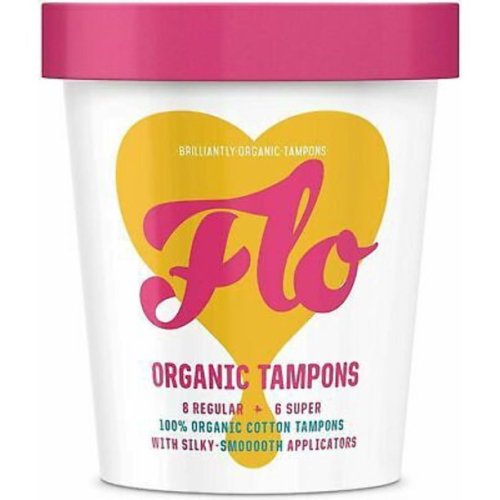
Flo, Organic Tampons (16-Count) — $14.00
As with Viv, Flo organic-cotton tampons replace a typical plastic applicator with a sugarcane-derived one in order to be wholly plant-based, which has “helped us avoid many of the shortages that mainstream brands are facing,” says Chandra. Flo also offers also the option for applicator-free tampons, for even less waste.
Materials: Organic cotton, sugarcane-derived applicator
Tampon sizes: Regular, Super
Pros:
- 100 percent recyclable, 95 percent plant-based
- Applicator-free option
Cons:
- Limited size options
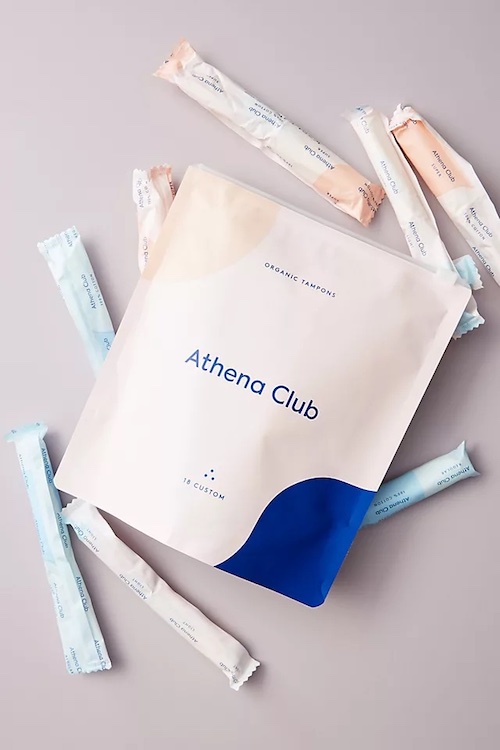
Athena Club, Organic Tampons — $8.00
With both fully organic-cotton and organic-rayon blend tampons, Athena Club, which sells 18 tampons for $8, has options depending on what you’re going for. The variety has also helps the company keep ample stock available. “We plan ahead with our suppliers, and work diligently to ensure we never stock out—especially for our period-care products and particularly because we are a subscription-based business,” says Maria Desmarais, cofounder and co-CEO of Athena Club, which also makes a range of other personal-care products.
Materials: Either cotton-rayon blend or organic cotton tampons, cardboard or plant-based applicators
Tampon sizes: Regular, Super
Pros:
- Affordable pricing (even the organic tampons)
- Choice of applicator type
Cons:
- Less size options
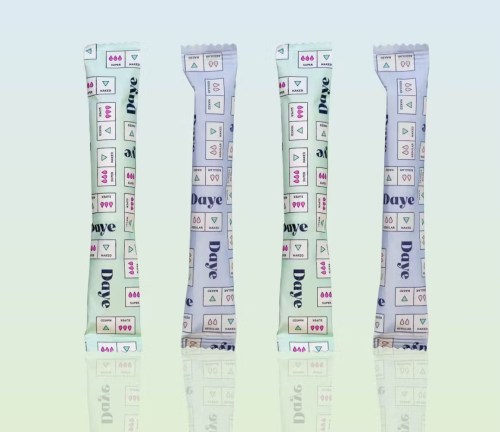
Daye, Nude Organic Tampons (18-Count) — $11.00
Daye takes their sustainability efforts up a notch by introducing a dissolvable, flushable wrapper. Plus, their tampons use a no-shed protective sleeve and are made from 100 percent organic cotton. You can choose between their organic “Nude” tampons, or their tampons that include THC-free CBD, which the brand says helps relieve pain from period cramps. Or, if you’re not sure which to go for, you can opt for their Trial Box, which includes a mix of both.
Materials: Organic cotton, sugarcane-derived applicators, THC-free hemp CBD (optional)
Tampon sizes: Regular, Super
Pros:
- Flushable, dissolvable wrapper
- Option to add THC-free CBD
Cons:
- Less size options
Sign up for the Well+Good SHOP Newsletter
Get exclusive deals on wellness, beauty, fitness, and food products that have been hand-picked by our editors.
Got it, you've been added to our email list.
